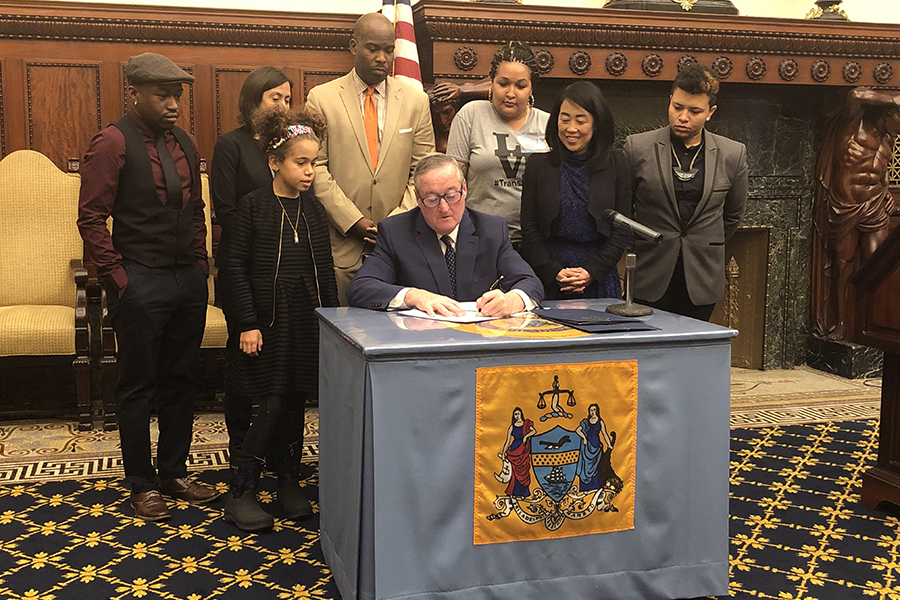Mayor Jim Kenney signed an “inclusivity package” expanding protections for trans, nonbinary and gender-nonconforming Philadelphians into law Thursday morning at City Hall.
The three bills, introduced by Councilmember Helen Gym, amend the city’s Fair Practices Ordinance with modern, inclusive definitions of “sexual orientation” and “gender non-conforming”; require youth organizations to implement policies ensuring nondiscriminatory treatment of trans and gender-nonconforming youth; and ensure City and public buildings provide accessible, gender-neutral bathrooms, including on each of floor of City Hall.
“It’s our responsibility as a city government to continue to fight for every member of marginalized communities to feel safe, be seen, recognized, affirmed and have inalienable rights under the law,” Kenney said, adding, “These bills are a testament to the city’s continued commitment to celebrating the experience and safety of transgender and gender-nonconforming people.”
Itzela, a 10-year-old nonbinary youth advocate who testified in support of the bills last month at a City Council Law and Government Committee hearing, said Thursday they support the “inclusivity package” because of how LGBTQ-positive environments can impact kids’ experiences at school and extracurricular spaces like camps.
They said they have attended camps “where the staff had training and support and created an inclusive and affirming environment, and it made a really big difference in my and other kids’ experiences. But it is important to my family and other families in Philadelphia to have affordable options for kids to go [to], and they need to be inclusive and affirming, too.”
The new laws “will make other children [feel] safe and welcome even if they are not out to their family or school,” Itzela added.
The policy package has been in the works since June. The bills take the city’s anti-discrimination law even further in protecting queer residents, Gym said.
“Trans rights are human rights, and in Philadelphia, everyone should feel welcome and supported in the place that we call the Sanctuary City,” she added.
No statewide legislation explicitly barring discrimination against the LGTBQ community exists in Pennsylvania. The 1955 Pennsylvania Human Relations Act states that it prohibits discrimination in employment, housing and public accommodations based on “race, color, religious creed, ancestry, age, sex, national origin, handicap or disability.” But the definition of “sex” is often left up to interpretation in the courts, said Naiymah Sanchez, a trans woman and the trans justice coordinator of the ACLU of Pennsylvania.
Legislation currently in the state Senate and state House, known as the Pennsylvania Fairness Act, would amend the state’s nondiscrimination law to include sexual orientation and gender identity or expression, to ensure LGBTQ protections.
Fifty-four Pennsylvania municipalities, including Philadelphia, Scranton, Lancaster and Harrisburg, have local ordinances prohibiting discrimination based on sexual orientation and gender identity in private employment, housing and public accommodations, according to data nonprofit Movement Advancement Project.
Sanchez, 36, told PGN that Gym’s bills being signed into law is important because it provides youth “with some kind of policy legislation to protect them so that they can live their truth” — protections she would have liked to have during her childhood.
“Now, the next step is … to educate people and try to get people to understand the intersectionality of our identities so we’re not just trans or nonbinary, but we also are Catholic, we’re Latinx, we’re Black,” Sanchez added. “We have all these other intersecting identities that make us the same.”
Sanchez also stressed the importance of folks reporting discrimination they experience to help ensure accountability and oversight of LGBTQ protections.
For Evan Thornburg, deputy director of the Mayor’s Office of LGBT Affairs, Thursday’s bill signing symbolized “immense pride and joy” in a time when much hostility exists on a national and global level, she said.
“Philadelphia has a longstanding history of pulling people in the direction of progress by decidedly saying, ‘We are going to be an inclusive space, we are going to be a space to understand, we’re going to be a space that learns about each other,’” Thornburg added. “And we’re going to be a space that encourages growth and encourages that progression no matter what anybody else is doing or saying on a larger scale.”
Kenney echoed the importance of ensuring a city environment in which people are treated “with respect and dignity all the time.”
“To have to go to school or work or wherever and feel that you’re being marginalized or being isolated because of who you are is a terrible, terrible feeling,” Kenney said. “We should make that feeling less and less. We have a responsibility to make sure we include everybody, that we embrace everybody and respect everybody. That’s what the city’s about, what the city will always be about.”
Updated 11/01/19 at 12:21 p.m. with additional information about the 1955 Pennsylvania Human Relations Act.

